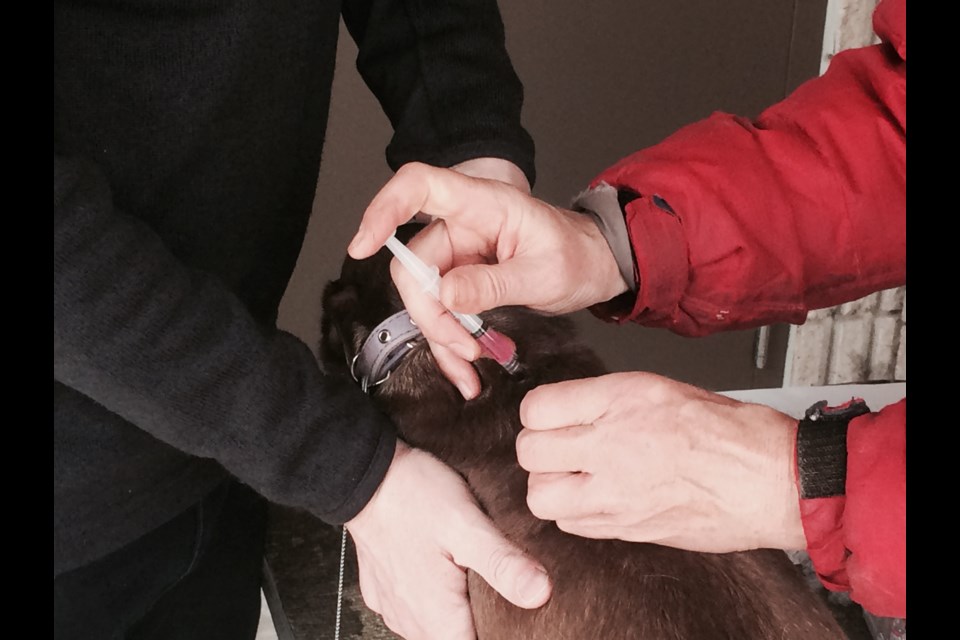Summer vacation is quickly approaching, and for many people, that means piling into the car with the family pet for that highly anticipated getaway.
Whether you’re headed somewhere near or far, it’s wise to do a quick check to make sure Fido or Fluffy's vaccinations are all up to date, including rabies.
Rabies is one vaccine many pet owners may not think to get for their furry friend, but it is required under the Ontario Health Protection and Promotions Act.
“It’s law that dogs and cats are vaccinated, otherwise people can get a very, very big fine because we’re also trying to protect humans, not just dogs and cats,” said Dr. Norma de Rose, of de Rose Veterinary Hospital.
“The mortality rate is pretty much 100% if the animal isn’t vaccinated. They would quarantine him and it’s very unlikely they’ll let him out again.”
Rabies attacks the brain and spinal cord of mammals, including humans, pets, wild animals and farm animals. Once the symptoms start, it is almost always deadly.
The North Bay Parry Sound District Health Unit is helping to promote a low-cost rabies clinic for pets three months of age or older. It took place June 25, at the South River Arena. The cost was $25 per pet three months of age or older. The clinic was organized by Dr. Frits Verzijlenberg Veterinary Hospital.
“A lot of people don’t visit their veterinarian on a regular basis, we at least make it possible to comply with this rabies rule by doing these clinics,” said Dr. Verzijlenberg.
“If the pet has never been vaccinated before, he needs to get a booster the year after, but after the first two vaccinations, it’s good for three years. So the animal that has been vaccinated will be good until 2021.”
Earlier in the spring, a similar clinic was held in Callander, where de Rose administered the vaccine.
In 2016 there were two confirmed cases of rabies in Ontario, one in Simcoe County and one in Haliburton.
“If a human receives a bite from an infected animal, if they know soon enough, they give them the antibodies for rabies, but it’s not without risks and there are definitely people in North America that die from rabies every year because they get bitten and they don’t realize they’ve been infected. Rabies is spread through the saliva of an animal that’s infected, into an open wound or your eyes or your mouth, “ said de Rose.
Sandy Briggs is the Animal Control Officer for Callander.
“It’s a local requirement, and it’s also a provincial requirement that animals have their shots. In the past clinics have done really well, but the numbers have dropped in the last couple of years, so we’re beginning to think that people are finally going to their vets.”
There are definite symptoms to watch for especially in wildlife.
“It depends on the stage, obviously the biggest thing is they’re afraid of water, they froth at the mouth, they look like they’re drunk, weaving around and not have any fear. Most wildlife have a reasonable respect for people, excluding raccoons who always seem to be friendly,” said Briggs.
Athens and Persia are two young country cats.
Owner Roxane Bedard brought the pair to the recent rabies clinic in Callander for their first rabies vaccines.
“They play outside a lot. They spend most of their days outside and they come in at night to sleep. So, therefore, I don’t want them getting any diseases like rabies, from playing with the raccoons and coming in the house and getting other animals sick, and me,” said Bedard.
“Now I know they can go outside and if they get bit by a raccoon or a stray cat around the area, they’ll at least be safe themselves.”
Jason Baljer had his three dogs vaccinated at the same clinic.
“We keep them inside the majority of the time, but if they’re out I don’t want to have to worry about the consequences of not having the vaccination. Everybody wants the reassurance.”
For Baljer’s wife Sara, it’s about having some peace of mind.
“We’re doing it in case they got off leash and we couldn’t find them for a few hours. We wouldn’t know where they’ve been and also I don’t want to get into any trouble if they happen to nip somebody when we are out.”
Wednesday’s clinic in South River runs from 6 to 7 p.m.



